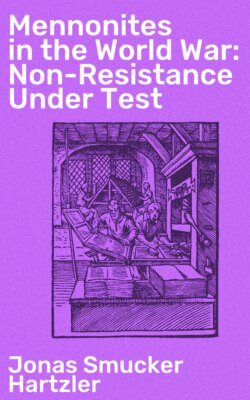Читать книгу Mennonites in the World War: Non-Resistance Under Test - Jonas Smucker Hartzler - Страница 51
На сайте Литреса книга снята с продажи.
Orchard and Holmes on War
ОглавлениеTable of Contents
Last, but not least, notice some of the spiritual effects. E. W. Orchard, in his book, "The Outlook for Religion/ presents the thought that less than a decade before the war a general idea prevailed "that progress was inevitable to humanity; an irresistible and quite mechanical power was working in the world which was forcing men upward, wheth er they would or not. … We were progressing, the dark ages were over, … a path of steady moral advance lay before us. And now? Well, one is not sure. We are once more back to barbarity. The war has developed a ferocity and inhumanity which would have been thought impossible a few years ago. We have had to consider the spectacle of the most educated, advanced nation in the world perpetrating the most frightful horrors, crashing through an innocent country with awful brutalities, and this justified by her statesmen on the plea of military necessity."
John Haynes Holmes, in his book, "New Wars for Old," says : "See for example the experience of Dr. Frederick Lynch, as narrated in his little book, Through Europe on the Eve of the War. One day he tells us, he saw merchants, clerks, farmers, peas ants, husbands, fathers, and brothers in France and Germany, going quietly about their business. On the next day had come the declaration of war, and instantly these men were transformed into beasts." The author then goes on to say what these same
46 MENNONITES IN THE WORLD WAR
people did after war had been declared, but it is too horrifying to be recorded in a work like this. He further states: "And all this before fighting had begun, or a single drop of blood had been shed. … Talk about war purifying, ennobling, strengthening men! Talk about war instilling patience, sacrifice, heroism in the human heart! War is the corrupter of virtue, the despoiler of purity, the murderer of courage, honor, and chivalry."
Smoking and Profanity
Thousands upon thousands of soldiers at the end of the war are accustomed to using profane language who were never known to utter an oath before. This is shown by a military man who in vestigated the cause. From a very large number of answers there were several causes suggested, but nearly all of them admitted that profanity had greatly increased in the camps. Possibly an equal number have learned to smoke who were clean men before the war broke out. The tobacco trust put out the idea that the people in America should soothe the boys in the trenches and show that they were being remembered by sending them cigars, cigarettes, tobacco, pipes, etc., and a great many Christian people fell into the trap, and helped the trust to turn clean men into inveterate smokers. Surely there will be a day of reckoning.
Immorality
This is another menace, shockingly apparent in many places. For illustration, let us quote from a government document, "A Message from the Gov ernment to the Churches of the United States." Among other things it says, "The war made it nee-
THE WORLD WAR 47
essary for the nation to face frankly and courage ously the menace of venereal disease. … Drastic measures must be taken to prevent during this per iod (demobilization) those conditions in civil life which made these diseases the GREATEST CAUSE FOR DEBILITY IN THE ARMY." Two things are certain; First, it must be true, or the govern ment would not have put out the statement; Second, it must have been alarmingly general, or the gov ernment would not have gone to the expense and labor of sending out pamphlets asking ministers to preach sermons on the care of soldiers after their return.
"Trench Salvation"
The profanity and immorality already noticed are an evidence of the wide-spread disregard for God and His Word. The "trench salvation" often preached from pulpit and press and camp encour aged this trend. According to this unscriptural doc trine the giving up of one's life in the cause of hu manity is an act so noble that God will extend to such an one His salvation independent of the kind of life that such an individual may have lived this by men who were professedly set for the defence of the Gospel, and in the face of such plain declara tions as, "No man cometh unto the Father except by me." "There is none other name under heaven given among men, whereby we must be saved," and "Except ye repent, ye shall all likewise perish." Thus was the doctrine of salvation only by grace through faith, as well as the life of individuals, corrupted through the exigencies of war.
At its best, war is cruel and inhuman, and is
48 MENNONITES IN THE WORLD WAR
constantly becoming more so as the -weapons are becoming more deadly and the whole is done with more precision. At one time it might justly have been called war, but today with the modern equip ment, and the definite calculations it should no more be called war, but scientific butchery.
